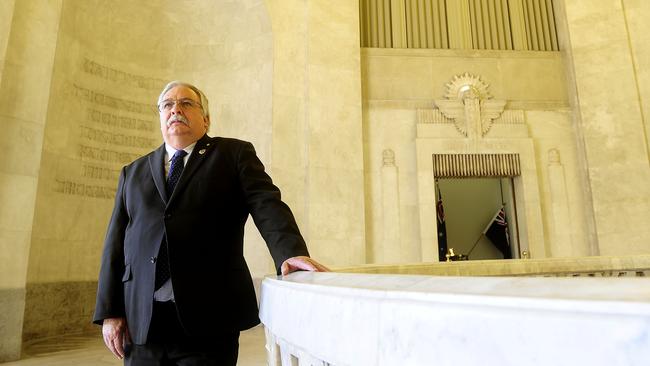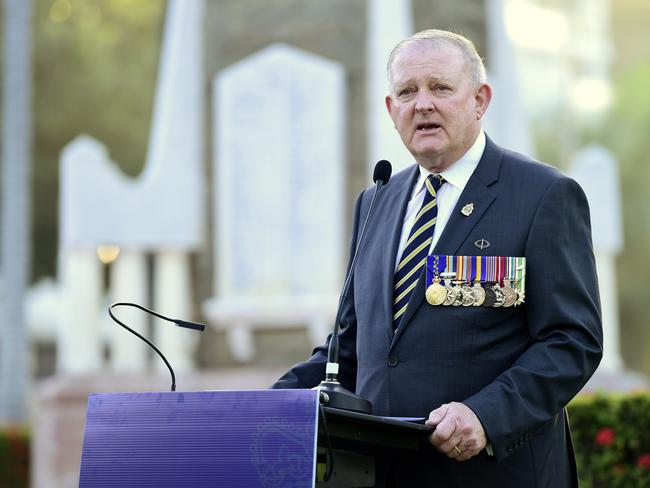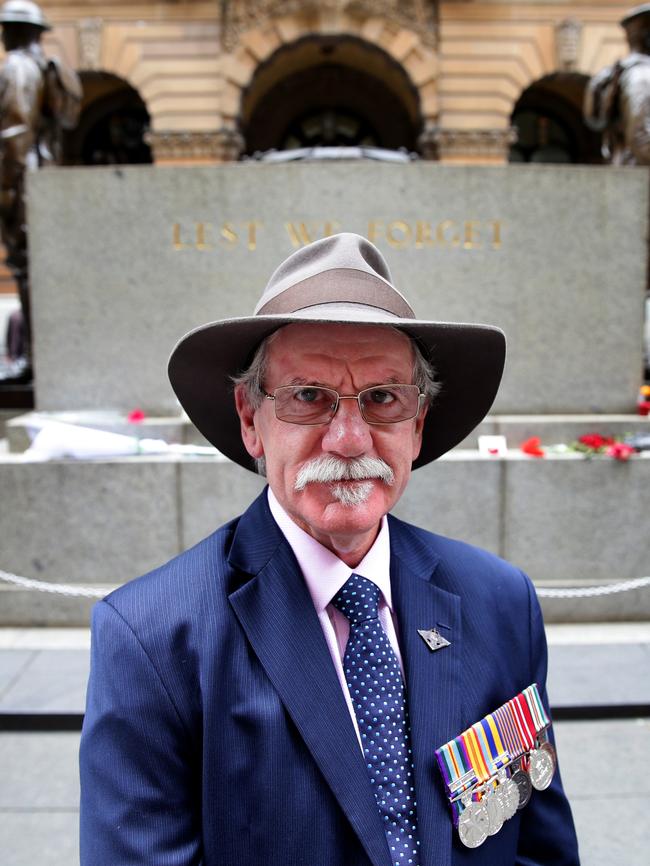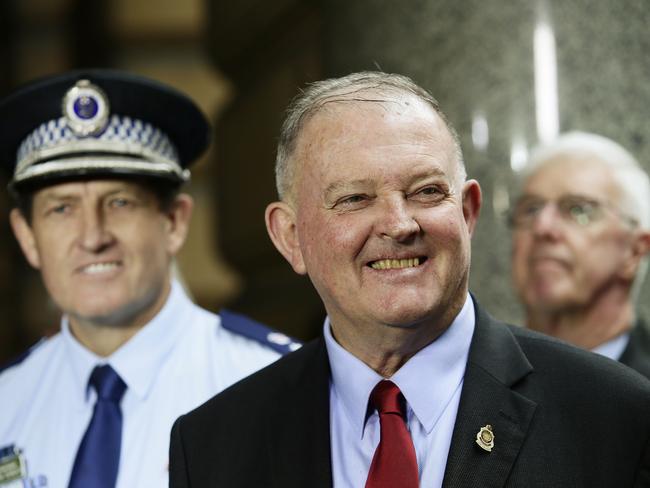RSL in disarray as young blood look to take command
As the RSL descends into chaos with allegations of corruption and members in revolt, is it time for the young guns to take over?

NSW
Don't miss out on the headlines from NSW. Followed categories will be added to My News.
When an accountant asked some awkward questions about a bloated phone bill belonging to former state RSL president Don Rowe, she could never have anticipated where it would lead.
Renata Terranova gave the bill to the chief financial officer Annette Mulliner, who passed it on to the treasurer Rod White, who took one look at it and gave the president an ultimatum: resign within the hour or we will conduct a financial audit.
Mulliner wrote a file note that fraught afternoon saying: “Mr White stayed in my office until he was called back to Mr Rowe’s office. I was advised soon after that Mr Rowe was resigning immediately.”
That was just the beginning of a multimillion-dollar financial scandal that has embroiled the entire state branch, leading to seven councillors resigning in protest, five separate investigations and open revolt among its 38,000 members, with accusations the 100-year-old institution had become a “corrupt old boys club”.

After his surprise resignation, Rowe was quietly ushered out of Anzac House on Castlereagh St and received a dignified farewell far from the state headquarters in his home town of Armidale, with the official reason for his resignation being ill-health.
He then packed his caravan and, with his wife, drove off on a trip around Australia — unaware that within a year he would be at the centre of a massive financial scandal.
Despite White’s promise, two financial audits of Rowe’s expenses were undertaken, and the second report, released in December last year, sent the RSL into bill shock.
A five-year analysis by KordaMentha revealed Rowe had spent $475,000 on his corporate credit card between 2009 and 2014, including $213,000 in cash withdrawals.
Meanwhile, his phone bill was $38,373 over the same period, with Rowe admitting he had connected five family members’ mobiles to his Optus account paid for by the RSL.
But the allegations of financial misconduct did not end there.
The auditor’s spotlight also focused on White, who had by then become RSL National President, and the generous “consultancy fees” he was allegedly paying himself as a director of the League-affiliated nursing home company, RSL LifeCare.

That audit found that White and nine other directors of RSL LifeCare, including Rowe, were paid $2.5 million in “consultancy fees” over a decade.
Not only that, but White was on the committee that authorised $1,065,593 in donations from sub-branches and women’s auxiliaries to go to RSL LifeCare over four years.
Those bombshells released in the interim findings of the KordaMentha report shook Anzac House to the core.
It has sparked five separate investigations into the NSW State Council, including by the Australian Charities and Not-for-profit Commission, which claimed the RSL may lose its charitable status, and a criminal investigation by Fraud and Major Crime Squad into Rowe’s monster credit card bill.
The RSL National Board has joined the attack, charging the state councillors last month with covering up Rowe’s expenses and bringing the organisation into disrepute.
Meanwhile, the 38,000 members are hefting their own pitchforks with around 70 sub-branches voting for an Extraordinary State Congress to decide if the councillors should stand down. They need 75 of the 364 sub-branches to vote in favour for a congress to be held.

This week the state council managed to fan the flames of outrage even further by coming up with an audacious proposal that they would temporarily stand down pending an internal inquiry while requesting RSL National withdraw the charges.
At a meeting on Monday they also resolved to request that RSL National let them choose who would be appointed caretaker in their place, naming the recently retired RSL Victoria president David McLachlan as their preferred choice.
RSL National took a dim view of the proposal, with acting president Robert Dick releasing a statement saying “the charges still stand”.
Besieged on all fronts by investigators and angry members, the councillors appear to be tired old generals blind to the fact they should have raised the white flag months ago.
One RSL member who wished not to be named said it was just a question of “who will get to the council first”.
“Will it be the membership? RSL National? The regulators ACNC or ASIC? The RSL Board of Inquiry? Clearly it’s a council whose positions as councillors have become untenable and as such their days are numbered — everyone is able to see it but the council members themselves.”
Some have pointed to the financial scandal as a signal that the old Vietnam veterans have passed their use-by date at the helm of the half-a-billion-dollar organisation and it is time that younger veterans from the conflicts in Afghanistan and Iraq were allowed to modernise the League.
They see the state elections scheduled for the third week in May as an opportunity to sweep the council clean of the old guard.
Even one longstanding councillor, Peter Stephenson, who decided to step down after being charged by the RSL National, said it is time for generational change.
“The average age of our members is 69 and we are struggling to bring younger veterans in to refresh our ranks,” Stephenson wrote in a recent opinion piece for The Daily Telegraph.
“Whilst age is not the only criteria on which our leaders should be assessed, it poses a serious risk for the RSL that so many candidates … are 80 years of age or older. How can we hope to connect with today’s society, let alone younger veterans, when these leaders struggle to use email let alone Facebook?”
Former state Liberal politician and candidate for RSL state president Charlie Lynn disagrees that this is a struggle between old and young veterans — he is 72.
But he does believe the RSL is becoming irrelevant for younger veterans, pointing to a number of initiatives set up by those who served in Afghanistan and Iraq that are outside the League such as Soldier On, Mates for Mates and Walking Wounded.
“The RSL should be the umbrella body for all those organisations. If you want to lobby and protect the interests of the legacy of the RSL you have to go to the government with a united voice,” he said.
James Brown, vice-president of North Bondi RSL and the son-in-law of Prime Minister Malcolm Turnbull, is a candidate for state president.
He said it was wrong to paint the calls for reform as a campaign by younger veterans to take over the organisation.
“What we are asking for is competent leaders, regardless of age,” he said.
“That said, it is widely understood across the RSL that we are having trouble recruiting younger veterans … we need to think about who can lead the organisation five, 10 years from now. If we don’t bring younger leaders into the RSL, it will not survive for another century.”


